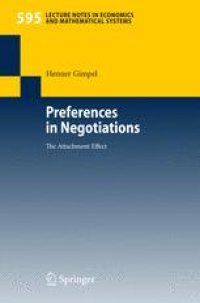
Ebook: Preferences in Negotiations: The Attachment Effect
Author: Dr. Henner Gimpel (auth.)
- Tags: Operations Research/Decision Theory, Microeconomics, Game Theory Economics Social and Behav. Sciences, Behavioural Sciences, Psychology general
- Series: Lecture Notes in Economics and Mathematical Systems 595
- Year: 2007
- Publisher: Springer-Verlag Berlin Heidelberg
- Edition: 1
- Language: English
- pdf
Negotiations are ubiquitous in business, politics, and private life. In many cases their outcome is of great importance. Yet, negotiators frequently act irrationally and fail to reach mutually beneficial agreements. Cognitive biases like overconfidence, egocentrism, and the mythical fixed pie illusion oftentimes foreclose profitable results. A further cognitive bias is the attachment effect: Parties are influenced by their subjective expectations formed on account of the exchange of offers, they form reference points, and loss aversion potentially leads to a change of preferences when expectations change.
This book presents a motivation, formalization, and substantiation of the attachment effect. Thereby, preferences and behavior are approached from a microeconomic and a psychological perspective. Two experiments show clear evidence for a systematic bias. The results can be used for prescriptive advice to negotiators: either for debiasing or to systematically affect the counterparty.
Negotiations are ubiquitous in business, politics, and private life. In many cases their outcome is of great importance. Yet, negotiators frequently act irrationally and fail to reach mutually beneficial agreements. Cognitive biases like overconfidence, egocentrism, and the mythical fixed pie illusion oftentimes foreclose profitable results. A further cognitive bias is the attachment effect: parties are influenced by their subjective expectations formed on account of the exchange of offers, they form reference points, and loss aversion potentially leads to a change of preferences when expectations change.
This book presents a motivation, formalization, and substantiation of the attachment effect. Thereby, preferences and behavior are approached from a microeconomic and a psychological perspective. Two experiments show clear evidence for a systematic bias. The results can be used for prescriptive advice to negotiators: either for debasing or to systematically affect the counterparty.
Negotiations are ubiquitous in business, politics, and private life. In many cases their outcome is of great importance. Yet, negotiators frequently act irrationally and fail to reach mutually beneficial agreements. Cognitive biases like overconfidence, egocentrism, and the mythical fixed pie illusion oftentimes foreclose profitable results. A further cognitive bias is the attachment effect: parties are influenced by their subjective expectations formed on account of the exchange of offers, they form reference points, and loss aversion potentially leads to a change of preferences when expectations change.
This book presents a motivation, formalization, and substantiation of the attachment effect. Thereby, preferences and behavior are approached from a microeconomic and a psychological perspective. Two experiments show clear evidence for a systematic bias. The results can be used for prescriptive advice to negotiators: either for debasing or to systematically affect the counterparty.
Content:
Front Matter....Pages I-XIV
Introduction....Pages 1-14
Theories on Preferences....Pages 15-72
Preferences in Negotiations....Pages 73-110
Internet Experiment....Pages 111-139
Laboratory Experiment....Pages 141-223
Conclusions and Future Work....Pages 225-243
Back Matter....Pages 245-270
Negotiations are ubiquitous in business, politics, and private life. In many cases their outcome is of great importance. Yet, negotiators frequently act irrationally and fail to reach mutually beneficial agreements. Cognitive biases like overconfidence, egocentrism, and the mythical fixed pie illusion oftentimes foreclose profitable results. A further cognitive bias is the attachment effect: parties are influenced by their subjective expectations formed on account of the exchange of offers, they form reference points, and loss aversion potentially leads to a change of preferences when expectations change.
This book presents a motivation, formalization, and substantiation of the attachment effect. Thereby, preferences and behavior are approached from a microeconomic and a psychological perspective. Two experiments show clear evidence for a systematic bias. The results can be used for prescriptive advice to negotiators: either for debasing or to systematically affect the counterparty.
Content:
Front Matter....Pages I-XIV
Introduction....Pages 1-14
Theories on Preferences....Pages 15-72
Preferences in Negotiations....Pages 73-110
Internet Experiment....Pages 111-139
Laboratory Experiment....Pages 141-223
Conclusions and Future Work....Pages 225-243
Back Matter....Pages 245-270
....